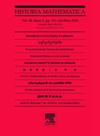Giovanni Rizzetti(1675–1751)对18世纪意大利加泰罗尼亚数字的测定
IF 0.4
3区 哲学
Q3 HISTORY & PHILOSOPHY OF SCIENCE
引用次数: 0
摘要
我们讨论了意大利学者Giovanni Rizzetti(1675–1751)面临的概率问题,并认为这是我们今天所称的“选票序列”的一个变体,加泰罗尼亚数字提供了一个解决方案。里泽蒂对解决方案的探索使他产生了一个迭代规则,其中涉及到加泰罗尼亚数字的考虑。尽管提出这些并不是他的最终目标,但他制定的规则允许他继续计算,只要他想。因此,这可能是第一次确定这样的数字。本文章由计算机程序翻译,如有差异,请以英文原文为准。
A determination of Catalan numbers in 18th century Italy by Giovanni Rizzetti (1675–1751)
We discuss the probabilistic question faced by the Italian scholar Giovanni Rizzetti (1675–1751) and suggest this is a variant of what we refer to today as the “ballot sequences”, variant to which Catalan numbers offer a solution.
Rizzetti's search for a solution led him to produce an iterative rule which involved the consideration of Catalan numbers. Although coming up with these were not his final goal, the rule he elaborated allowed him to carry on calculating them as long as he wanted. As such, it is possible this was the first time such numbers were determined.
求助全文
通过发布文献求助,成功后即可免费获取论文全文。
去求助
来源期刊

Historia Mathematica
数学-科学史与科学哲学
CiteScore
1.10
自引率
0.00%
发文量
29
审稿时长
72 days
期刊介绍:
Historia Mathematica publishes historical scholarship on mathematics and its development in all cultures and time periods. In particular, the journal encourages informed studies on mathematicians and their work in historical context, on the histories of institutions and organizations supportive of the mathematical endeavor, on historiographical topics in the history of mathematics, and on the interrelations between mathematical ideas, science, and the broader culture.
 求助内容:
求助内容: 应助结果提醒方式:
应助结果提醒方式:


